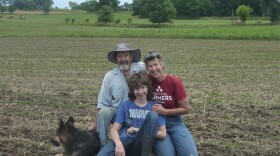A piece of prehistoric history that was unearthed in southern Iowa is being carefully preserved at the Office of the State Archaeologist.
In summer 2024 University of Iowa archaeologists and a group of community volunteers excavated a mastodon skull and several other bones in Wayne County as part of a discreet operation. This work happened after a private landowner discovered partially exposed bones protruding from a creek bed in 2022. After more than 1,000 hours of work, the ancient animal remains came to the surface. Despite being thousands of years old, the bones are not yet old enough to have fossilized.
“On one level, mastodons aren't rare,” said John Doershuk, director of the Office of the State Archaeologist, while holding a rib from the Ice Age across his lap. “There are probably Mastodon teeth or maybe a piece of a rib, a small portion of one of these animals in almost every county in the state, but it is very rare to find a large collection of bones together in one place.”
Radiocarbon dating determined this skull to be 13,600 years old. The mastodon, a large mammal similar to an elephant or mammoth, went extinct about 13,000 years ago, toward the end of the Ice Age. Their time in Iowa overlapped with the earliest evidence of humans in this part of the country.
The preservationists working on the bones have not yet discovered evidence that this animal had a direct human interaction – such as damage from stone tools – but Doershuk hopes that, regardless, the discovery will make Iowans think about the history of the land differently.
“We want to make sure that this thing is done as appropriately as possible, to heighten the value to the public and increase their appreciation for the past, not just of mastodons, but of the human past, as well, that exists in Iowa,” Doershuk said.
He added that most people don’t appreciate how long humans have been on this land.

Much of the mastodon skull is still covered in dirt and clay, but when the cleaning and preservation is complete, the mastodon will be displayed at the Prairie Trails Museum of Wayne County. The museum, landowner and state archaeologists made an agreement that the remains will be on loan for 10 years, with the option to renew every five years.
Brenda DeVore, the museum’s director, said this is the epitome of her career. She anticipates the bones to be installed in the museum in summer of 2026.
“We want to have some educational things, and maybe even a bone or two that's been 3D printed so people can actually touch," said DeVore.
The museum often welcomes tour groups, so it can engage children with hands-on experiences.
DeVore said the discovery has changed the way she thinks about Wayne County.
“It makes you wonder what else is under that ground.”
To hear this conversation, listen to Talk of Iowa, hosted by Charity Nebbe. Samantha McIntosh produced this episode.






